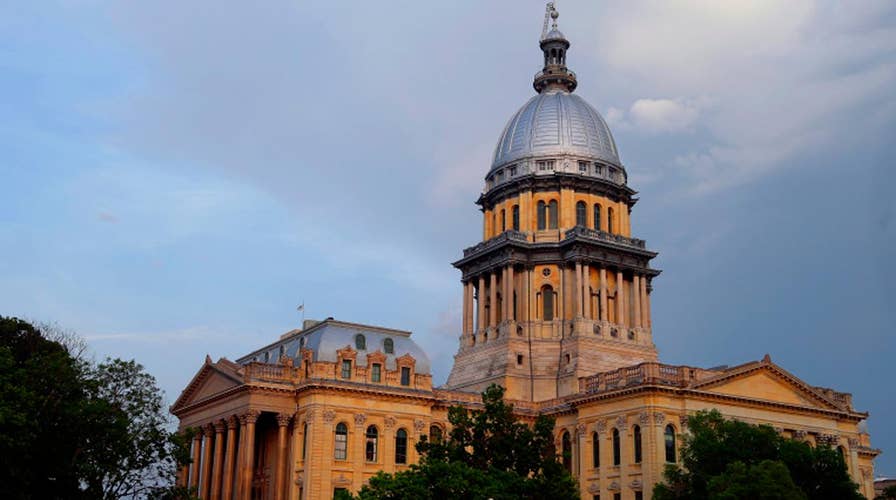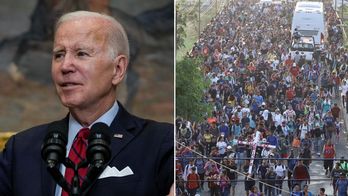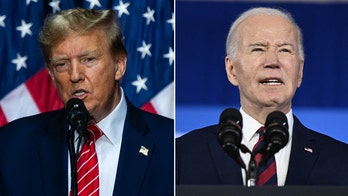Illinois could enter third fiscal year without budget deal
State faces financial crisis as Republican governor and Democratic lawmakers remain at odds; Jeff Flock reports from Chicago
The Illinois Senate approved an income tax increase Tuesday to raise $5 billion a year aimed at ending the nation's longest state budget crisis since at least the Great Depression.
The Democratic-controlled Senate voted 36-18 to hike the personal income tax rate by 32 percent. It would increase the personal rate from 3.75 percent to just under 5 percent. Corporations would pay 7 percent instead of just over 5 percent.
Minutes after the House passed the measure on Sunday, Republican Gov. Bruce Rauner vowed to veto it because Democrats who control the General Assembly have yet to agree to resolve certain issues. Those issues include statewide property tax relief, cost reductions in workers' compensation and benefits for state-employee pensions, and an easier process for dissolving or eliminating local governments.
Chicago Democratic House Speaker Michael Madigan pledged an override.
On Monday, two of the nation's top credit-ratings agencies signaled it would be a good idea for Rauner to accept the results. Fitch Ratings and S&P Global Ratings, having earlier threatened to move Illinois' creditworthiness into "junk" status without swift action to approve a budget, smiled favorably on the financial outlook.
Illinois has entered its third consecutive fiscal year without a budget plan because Rauner has resisted inking a deal without business- and political-climate changes to boost commerce, restore political faith and relieve local property-tax owners.
Ratings agencies are monitoring the potentially disastrous side effects: A $6.2 billion annual deficit, $14.7 billion in past-due bills, and the parceling out of payments to service providers that prompted a federal judge on Friday to order the state to pay nearly $300 million more per month owed to managed-care Medicaid providers.
Fitch and S&P put Illinois' bond rating at "BBB-minus," or one step above "junk," a designation that would signal to investors that buying Illinois debt is a speculative venture. Moody's Investors Service was closed Monday for the holiday.
Madigan said he was pleased with the credit-rating news, but the agencies expressed caution.
"If a budget is enacted, the degree to which it closes the state's structural deficit, provides a pathway for addressing the backlog of unpaid bills, and its impact on cash flows, will be important factors in our review of its effect on Illinois' credit quality," the S&P analysis read.
Fitch wants to see a full-year spending plan, not a stop-gap measure like the one that financed Illinois' government for just the last six months of 2016.
"Temporary or partial measures, or a failure to enact a budget within the context of this session, would result in a downgrade," it said.
Democrats and Republicans have negotiated the issues that Rauner considers outstanding in the two weeks since the special session began. But the GOP claims talks broke down over the weekend in advance of Madigan calling the budget votes. Madigan said Monday that those talks were ongoing.
"We'll continue to work with the Republicans on those issues until they're resolved," Madigan said.
Republicans appear unconvinced. Rauner spokeswoman Catherine Kelly said the speaker was "clearly trying to distract from his 32 percent permanent tax hike." Spokeswomen for Senate Minority Leader Bill Brady and House Minority Leader Jim Durkin would not say why the two men didn't attend Monday's meeting, but Durkin's office said he would not attend Tuesday. Brady's spokeswoman indicated without all leaders attending, Brady won't either.
The absences raised questions in Cullerton's mind about where negotiations, particularly on the tangential Rauner demands, stand.
"We have to do something," Cullerton said. "The House has acted but we'd prefer to do it in agreement with Republicans."





